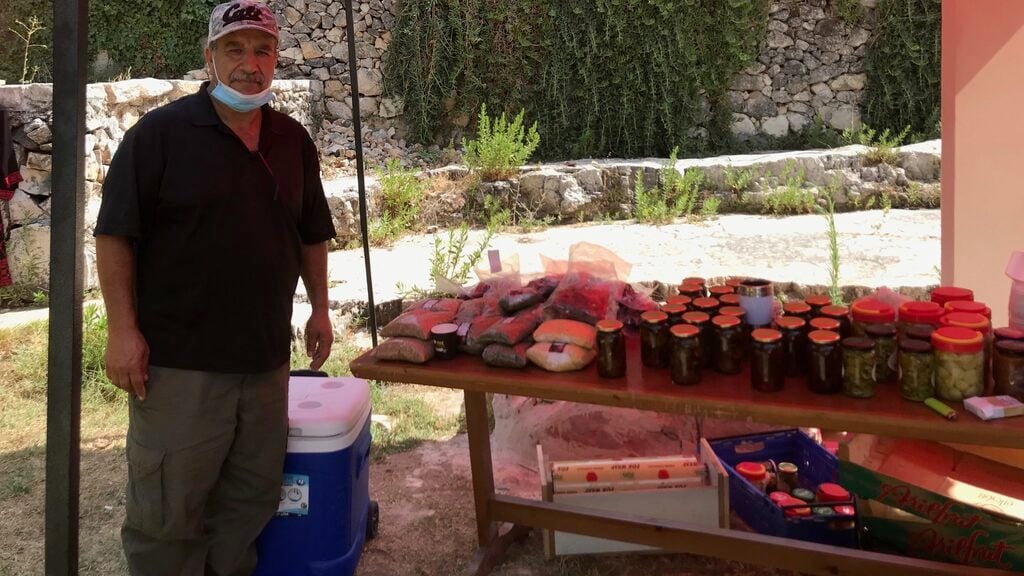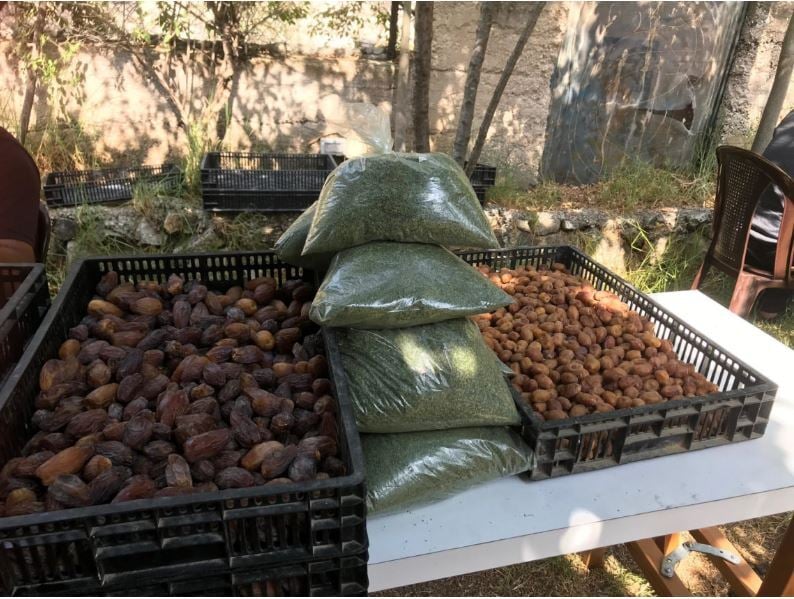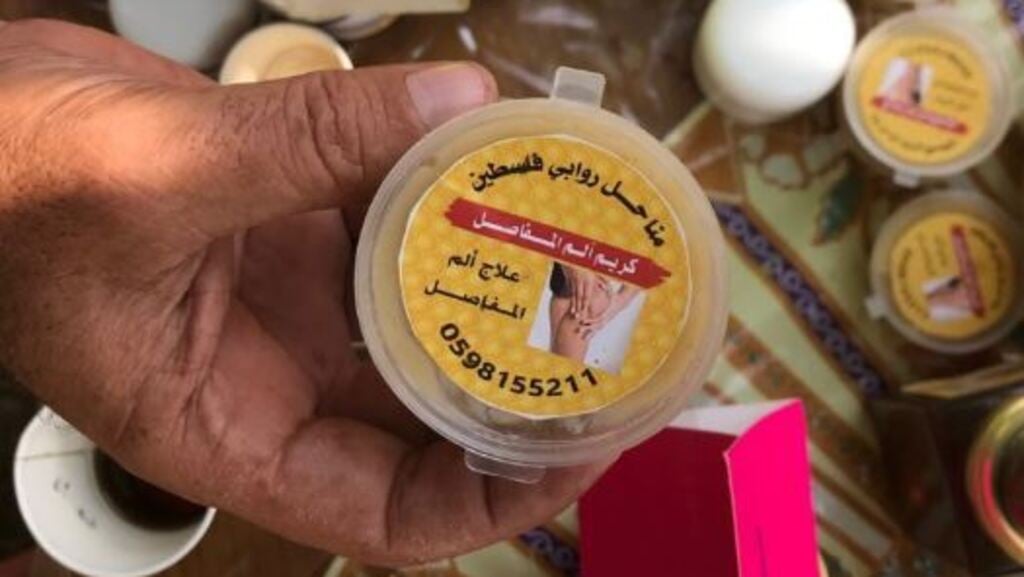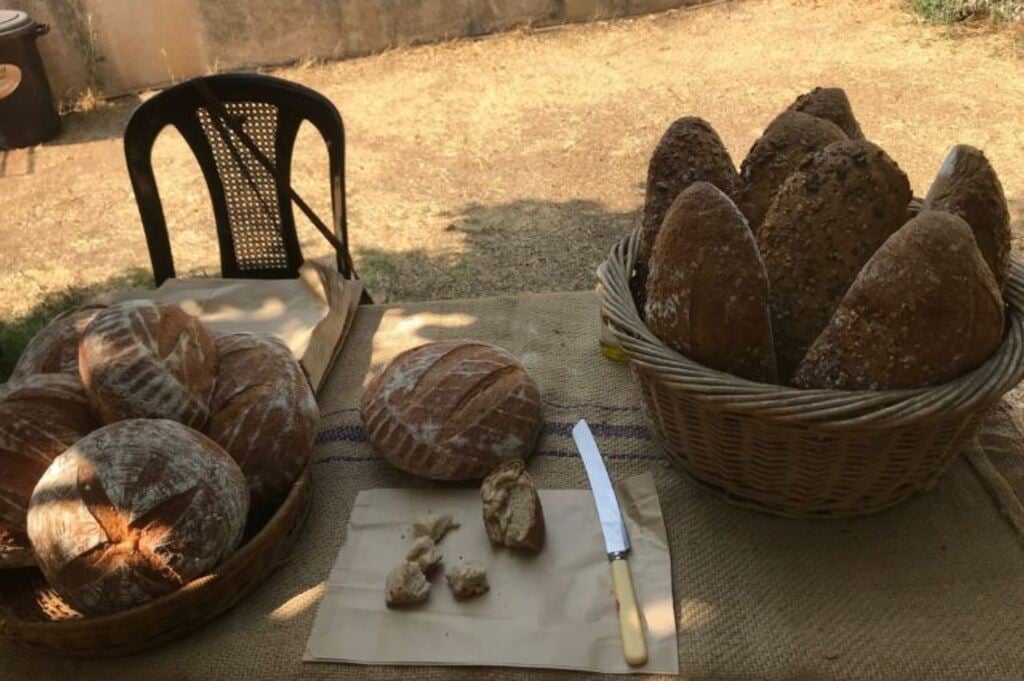A group of self-styled Palestinian "peasants" who support their families by working small parcels of land has been getting together twice a week for seven years, determined to help the vulnerable local agricultural sector bring its produce to market despite a lack of support from the Palestinian Authority and the loss of vast areas of the West Bank to Israeli control.
Their alternative market in the central West Bank city of Ramallah brings together nearly a dozen farmers and producers who sell local seasonal vegetables, fruit and food products, including traditional meals.
4 View gallery


Palestinian 'peasant' Naser Rabah shows off his wares at Ramallah’s alternative souk, August 2020
(Photo: Fatina Hamad)
They insist on calling themselves peasants rather than farmers, saying that while farming can be seen merely as a profession, peasantry is a way of life, which means that a family eats its own produce and sells the surplus.
Walking into their souk (Arabic for market) the question of what makes it different from the city’s wholesale fruit and vegetable market is quickly answered.
The peasants turn it into a space to protest against the lack of support for the agricultural sector, where they meet customers and open up discussions on myriad topics, from politics to social affairs all the way to the latest solutions to their agricultural issues.
"Milk, honey, chemical-free vegetables and fruits, bread and even local embroidery can take you deep into the stories of the peasants, their families, their ambitions and their needs," says Fareed Tomallah, an organizer of the alternative souk.
“The peasant here doesn’t only sell tomatoes; he shares his story with his customers and creates a bond that might lead to other forms of partnerships and cooperation,” he says.
4 View gallery


Dates for sale at Ramallah souk run by the Palestinian ‘peasants’
(Photo: Fatina Hamad)
The souk this year is plastic-free to encourage people to look at the impact of such materials on the environment.
Naser Rabah, 57, from the West Bank village of Turmus Ayya, lived for 25 years in the Los Angeles area, where he worked in agriculture. He decided to rehabilitate more of his land, to expand his production despite fears that he would have difficulty selling his goods.
“I might be able to sell a third of my produce, but the farmers are not getting any support from the [PA] government. We know they cannot do anything, but we keep trying and hope to push them to look at us,” Rabah says.
“I brought all the know-how I learned in the U.S. because Palestine is agricultural land,” he continues, “but why can’t we live from it?”
Um Ammar, 69, from Beitunia, joined the market this year after nearly 30 years of selling her produce elsewhere.
“The wholesale market is crowded and there is no place to sit or to avoid the sun,” she explains. “For us, this market is better, smaller, and I enjoy it here because I meet other people and share so many things.”
She chuckles and winks at Fatima Mustafa, her witty next-door neighbor at the alternative souk, who sells traditional embroidery.
Mustafa runs a network of women who make the embroidery, which she normally sells in the West Bank, Jerusalem, the Israeli city of Nazareth and even at regional fairs as far afield as Qatar, Kuwait and Turkey.
But at 68, the biggest challenge for her now is the coronavirus pandemic. In addition, health guidelines prevent her from selling her wares inside Israel, with her merchant’s permit having been suspended.
“I haven’t sold a single piece of work since December and I’m afraid that I will keep eating and gaining more weight because [my friends in the market] think I’m vulnerable to the coronavirus,” she jokes.
Old and young, the peasants who produce food are numerous and have a lot to share.
For example, Abdulkarim and Raeda Hamad, a couple married for 33 years, are business partners.
They carry on the beekeeping and honey-making business they inherited from their grandparents and allow their tech-savvy children to market their production, using social media and modern marketing tools.
At the other corner of the souk, 30-year-old Tamara Shatara offers a basket-full of the sourdough bread she started baking three years ago as a solution to her gluten allergy.
“I want to sell my bread because at one point in my life, it was all I was trying to do, and I want to keep explaining to people all that I’ve learned,” she says.
“Even though it is French bread, the technique was used by our forefathers long ago.”
Jamal Njoum, a date farmer from Al-Auja village in the Jordan Valley, employs a bit of sarcasm and lifts a sign calling on people to “taste but not buy” the wares on his table.
“Frankly, people do not know how much effort we put into date production,” he says, complaining that “tons of dates” are regularly imported.
“The local market is a problem,” he notes. “We small-scale farmers barely sell locally.”
At the end of the day, the peasants pack up their goods and leave for home. They have smiles on their faces even if they did not sell much.
“It is the stories we share that count,” Um Ammar says of the alternative souk, “and that is what makes me happy I joined.”



